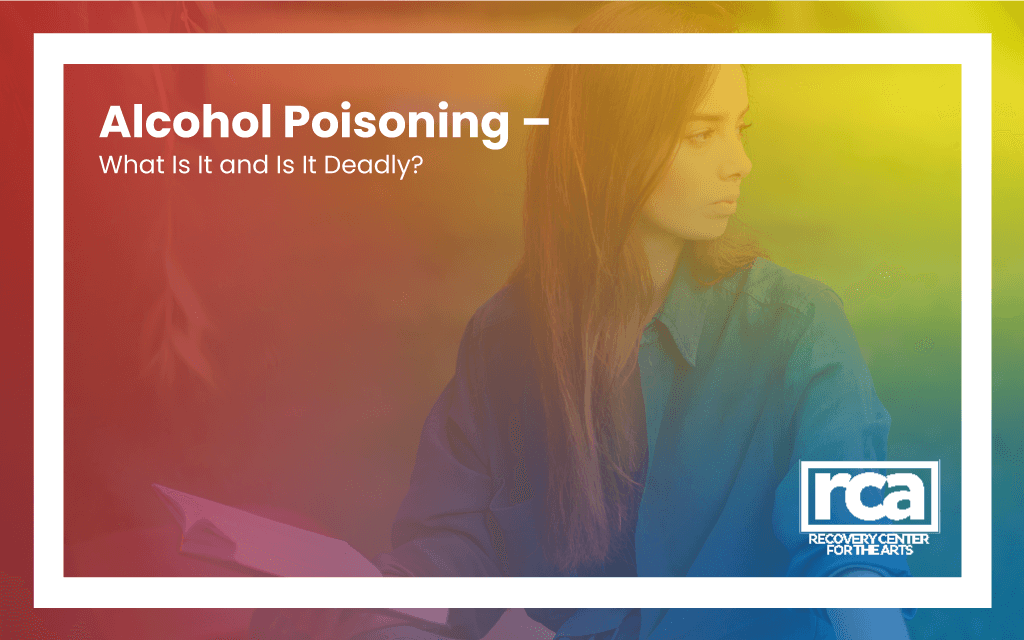
“I can taste last nights regrets on my tongue
stale
dry
like I spilled so many words
my mouth has nothing left to taste.”
- Liquid Memory by RC
Have you ever passed out before? Or woken up and realized you can’t remember how you got into your bed that night before?
Maybe you’ve woken up in places you don’t recognize, with people you don’t know.
Unconsciousness and memory loss are just two of the symptoms associated with alcohol poisoning. With nearly 1 in 5 adults in Arizona reporting binge drinking at least once a month, it’s a real concern for our community. What is alcohol poisoning? Is it dangerous? Are there steps you can take to avoid it while still drinking?
Our team at Recovery Center for the Arts has extensive knowledge in this area. We know how alcohol works and how it can impact your body and mind over time. To help you make informed decisions about your health and drinking, today we’re going to answer your common questions about alcohol poisoning.
What Is Alcohol Poisoning?
You’ve likely heard of overdosing before, but what is alcohol poisoning? Is it an alcohol allergy? Is it why we throw up after a long night of drinking?
Alcohol poisoning is another name for alcohol overdose. It’s when your body has so much alcohol in your system that it gets overwhelmed. Alcohol is toxic to the body. When more is present than your body can process, it starts to greatly impact your other organs outside of your digestive system. It can reach levels that are toxic, leading to side effects, the shutting down of your organs, and a risk of death.
Why Does Alcohol Poisoning Happen?
We already touched on it in the last section, but let’s dive into it further. If alcohol is toxic to the body, why can we drink it at all? Is there a set number of drinks that always causes alcohol poisoning?
To answer this, let’s talk about how alcohol is processed in the first place.
When you drink alcohol, the primary system involved in getting it through your system is the digestive tract. This includes everything from your stomach to your liver, intestines, kidneys, and bladder.
Your liver, however, plays the largest part in this process. It works through alcohol and passes it into the urine so it can leave your body. The liver processes any substance, from alcohol to medication, at a set rate. This means even if you’re drinking quickly, the liver won’t speed up.
Alcohol poisoning happens most frequently when many drinks are consumed in a short time frame. This exact time frame will vary from person to person, but when the liver is busy, alcohol still builds up in the body. This can lead to alcohol getting into your bloodstream and brain, where it can eventually overwhelm your body.
The Risk Factors for Experiencing Alcohol Poisoning
Certain scenarios and even genetics can lead to an increased risk of experiencing alcohol poisoning. Being aware of these risk factors, and if they apply to you, can help you better manage how much alcohol you consume in one sitting.
One factor that you’ll have no control over, but is still important to know, is your genetics. People of Asian descent are more likely to be allergic to alcohol, making the effects of it occur faster, and with higher risk. Additionally, there is a difference between those born male and those born female in how they process alcohol. This occurs because of differences in chemical production in the body, as well as different common levels of fat and water within the body. Men can drink slightly more alcohol before experiencing side effects as a result.
The other factors to consider relate to your history with alcohol, your personal health, as well as what you consumed that day. Having other substances, even medication, in the body can impact how much alcohol is too much. Liver damage also plays a role in how quickly the body can become overwhelmed.
According to the CDC, if women drink more than 4 drinks in one sitting, or men drink more than 5, this is considered to be binge drinking. Limiting the amount of alcohol you intake, or how quickly you drink it, is also key to avoiding alcohol poisoning.

Spotting the Signs of Alcohol Poisoning
It’s important to note that just because someone stopped drinking, doesn’t mean they aren’t at risk of experiencing alcohol poisoning. A person’s blood alcohol content (BAC), which is used to measure the levels of alcohol within the body, continues to rise for up to an hour after their last drink.
There is some overlap in common alcohol side effects and the effects of alcohol poisoning, but if you notice these symptoms in particular, it’s important to call for medical help.
- Increased confusion
- Dipping in and out of consciousness
- Clammy skin which can include blue tinting
- Slowed breathing, or gasping for breath
- Slowed heart rate
- Dulled reflexes, including gag reflex
- Vomiting
- Extremely low body temperature
- Seizures
What Should You Do if You or Someone Else Is Experiencing Alcohol Poisoning?
It can be difficult to identify alcohol poisoning within yourself, primarily due to the confusion and unconsciousness that comes with it. If you think you are experiencing it, try to get help, even if it’s a friend or family member. They will be in a better position to get you the medical attention you need.
Be upfront and honest with any medical professionals you talk to. This includes being honest about any additional drugs that were consumed. If other substances are involved, this is pertinent information for medical staff to know, so they can properly treat the person in need. Because of the [Good Samaritan Law](https://www.sargonlawgroup.com/the-arizona-good-samaritan-law-explained/#:~:text=The Arizona Good Samaritan Law restricts the liability of emergency,not subject to civil liability.), you cannot be legally prosecuted for seeking medical attention for drug use.
If someone experiences a seizure because of alcohol poisoning, there are a few things you can do to help. First, it’s important to time the seizure. This doesn’t have to be perfect timing if you’re unable to, but even a ballpark is important for medical staff to know.
Next, make sure you do not restrain the person who’s seizing in any way. You can put a folded-up jacket or towel under their head to brace it. Be prepared to roll them onto their side into the recovery position when their seizure is over. This helps ensure they don’t choke on any vomit or spit.
Alcohol poisoning doesn’t have to be fatal, as long as proper action is taken in order to address it.
Are There Ways to Combat Alcohol Poisoning at Home?
You cannot solve alcohol poisoning from home. There are many myths floating around online about how to “sober up,” but they’re not based on reality. No amount of coffee or cold showers will reduce the amount of alcohol currently in your system.
It is dangerous to assume someone can just “sleep off” their alcohol overdose. Not only can the slowed breathing and heart rate lead to lowered oxygen levels in the body, but the lessened reflexes can be dangerous, too. People who fall unconscious from alcohol poisoning are at risk of vomiting and choking on it. Alcohol poisoning can also lead to lasting brain damage.
We cannot stress enough, call for medical help if you think someone is experiencing alcohol poisoning.

How to Prevent Alcohol Poisoning – Seek Treatment for Alcoholism in Arizona Today
Whether you’ve experienced alcohol poisoning before, or you wish to avoid it happening to you, recovery is available to help. Finding an alcohol rehab program is the first step. Alcohol poisoning, and even long-term alcohol consumption, comes with health risks that can leave lasting damage. While several side effects of alcohol use can be addressed and even reversed with proper care, not all damage can be undone.
The only way to make your health better from the effects of alcohol is to seek healing.
But alcohol doesn’t just damage your body, it also damages your soul. It takes away your time to spend on creative endeavors and other hobbies you enjoy. You deserve to be able to live your life to the fullest and in the way you want.
No matter your history of alcohol use, recovery is always available. Our team at Recovery Center for the Arts is here to help. We work with you to offer well-rounded healing for you and your inner child. We want to see you succeed in your recovery. Give us a call anytime at (480) 386-1593 to get started.
Recovery Center for the Arts – Finding recovery through creativity.

